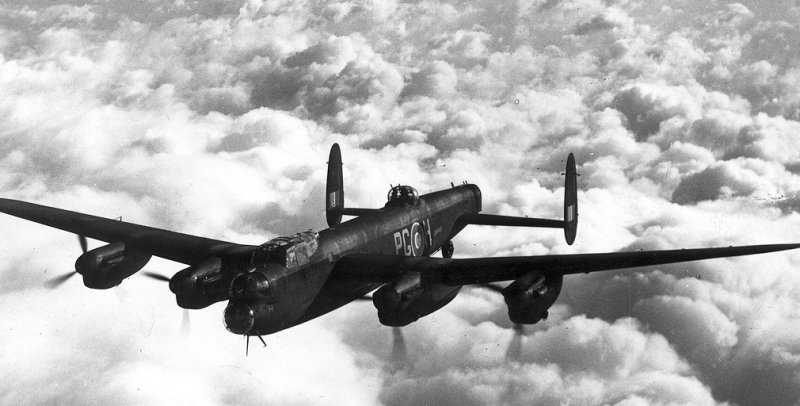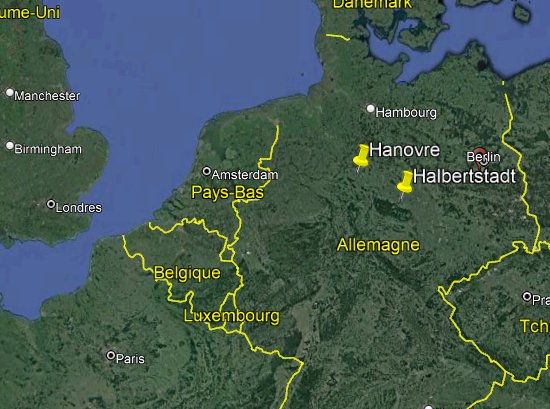ACUFO-1944-01-02-HALBERSTADT-1
In their 2002 book “Out of the Shadows”, Dr. David Clarke and Andy Roberts showed an extract from Flight Lieutenant Mortimer's Berlin raid report from the night of 2 January 1944:
“Engaged by two rockets in vicinity of Halberstadt and later near Hanover, 90 degrees alteration of course made and definitely established that rockets altered course. Overtook us slowly, appearing with a fiery head and blazing stern on a parallel course. Initial velocity seemed to be fairly great. Duration approximately one minute.”
| Date: | January 3, 1944 |
|---|---|
| Time: | Night. |
| Duration: | 1 minute. |
| First known report date: | January 1944 |
| Reporting delay: | Hours, days. |
| Country: | Germany |
|---|---|
| State/Department: | Saxony-Anhalt, Lower Saxony |
| City or place: | Halberstadt, Hanover |
| Number of alleged witnesses: | Several. |
|---|---|
| Number of known witnesses: | ? |
| Number of named witnesses: | 0 |
| Reporting channel: | RAF military operations report. |
|---|---|
| Visibility conditions: | Night. |
| UFO observed: | Yes. |
| UFO arrival observed: | ? |
| UFO departure observed: | ? |
| UFO action: | Fly parallel to aircraft and overcome it or them. |
| Witnesses action: | |
| Photographs: | No. |
| Sketch(s) by witness(es): | No. |
| Sketch(es) approved by witness(es): | No. |
| Witness(es) feelings: | ? |
| Witnesses interpretation: | ? |
| Sensors: |
[X] Visual: 1 or more.
[ ] Airborne radar: [ ] Directional ground radar: [ ] Height finder ground radar: [ ] Photo: [ ] Film/video: [ ] EM Effects: [ ] Failures: [ ] Damages: |
|---|---|
| Hynek: | NL |
| Armed / unarmed: | Armed, 8 7.62 mm machine guns. |
| Reliability 1-3: | 2 |
| Strangeness 1-3: | 3 |
| ACUFO: | Unidentified. |
[Ref. dcr1:] DR. DAVID CLARKE AND ANDY ROBERTS:
These authors explain that most foo-fighter sightings were passive, the phenomena simply appeared from nowhere and vanished just as mysteriously, without interaction with the airborne witnesses, but in several cases where aircraft were “chased”.
They show this extract from Flight Lieutenant Mortimer's Berlin raid report from the night of 2 January 1944, a detailed account of such a pursuit:
“Engaged by two rockets in vicinity of Halberstadt and later near Hanover, 90 degrees alteration of course made and definitely established that rockets altered course. Overtook us slowly, appearing with a fiery head and blazing stern on a parallel course. Initial velocity seemed to be fairly great. Duration approximately one minute.”
They comment that the word “rocket” to describe his encounter as although sightings were widespread, aircrews had not yet found a name for them: because they were small and fast-moving, rockets were the enemy weapon the foo-fighters most closely resembled, so they were often called rockets.
The authors find it unlikely that they were actually rockets or jets of any kind as German technology was insufficiently advanced to develop any form of ground-to-air or air-to-air rocket which could “chase” an aircraft; and the German jet fighter ME262 only played a limited role toward the end of the war and was easily spotted by Allied aircrews.
They recall that none of the foo-fighter witnesses who observed the phenomenon closely saw the outline of a rocket or aeroplane; nor did the foo-fighters ever shoot at Allied bombers or fighters - they just appeared and then 'disappeared without explosion.
[Ref. dwn2:] DOMINIQUE WEINSTEIN:
Flight Lieutenant Mortimer a Mosquito pilot (RAF 463 Squadron) reported: “engaged by two “rockets in the vicinity of Halberstadt and later near Hannover [sic], 90° alteration of course made and definitely established that rockets altered course. Overtook us slowly, appearing with a fiery head and blazing stern on a parallel course. Initial velocity seemed to be fairly great”. It disappeared without explosion. Duration: one minute.
Comments: According to Allied assessments, remote-control rockets were not in operation at that time.
Sources: Raid report M/463 Squadron night 2-3 Jan. 1944 / Strange Company, Keith Chester, 2007
[Ref. snu1:] "SATURDAY NIGHT UFORIA" WEBSITE:
This website indicates that in 1944, a 'Raid Report' from M/263 Squadron recounted the experience of a Mosquito pilot on the night of January 2/3, 1944:
“Engaged by two rockets in the vicinity of HALBERSTADT and later near HANOVER, 90 degrees alteration of course made and definitely established that rockets altered course. Overtook us slowly, appearing with a fiery head and blazing stern on a parallel course. Initial velocity seemed to be fairly great. Duration approximately one minute; Disappeared without explosion.”
The website cites a follow-up intelligence memo:
“He estimates that one of them was at range of approximately 200 yards at its closest and kept pace at this range with M/463 for 30/40 seconds. He did not fire, in case a hit might detonate it, causing damage to the aircraft at that range.”
[Ref. mmy1:] MACK MALONEY:
On the night of January 2, 1944, an RAF Mosquito night fighter operating over Germany had a strange encounter with an unidentified aerial object.
An extraordinarily fast airplane because it was made mostly of wood, this particular Mosquito was flying over the German town of Halberstadt when the pilot and his navigator saw what would be later described as a “rocket” following them. They reported the extraordinarily fast “rocket” overtook them, at one point turning 90 degrees to reach a course parallel with them. The crew watched this “rocket” for about a minute, until it finally disappeared.
This report was just one of many from Allied aircrews who'd spotted “rockets” while flying through Europe's war-ravaged skies. And for a time, “rockets” became one of the catchall phrases used by Allied intelligence to categorize all the mysterious flying objects being seen during combat. It was a safe word used in an attempt to “de-sci-fi” their reports to higher-ups.
But what this particular Mosquito crew encountered was no “rocket,” at least not in the 1944 sense of the word. The same was true for all those other “rockets” Allied aircrews were reporting.
Just what they were, beyond simply another type of foo fighter, still remains a mystery. But how foo fighters became labeled as “rockets” at least for a while is an interesting story.
[Ref. nip1:] "THE NICAP WEBSITE":
[1944] Jan. 2/3, 1944; Halberstadt, Germany
Two rockets; altered course; fiery head and blazing stern. (Page 54 Ref.1)
The reference 1 is described at the end of the document as “Strange Company (2007), Keith Chester”.
[Ref. tai1:] "THINK ABOUT IT" WEBSITE:
Date: Jan. 2/3, 1944
Location: Halberstadt, Germany
Time:
Summary: Two rockets; altered course; fiery head and blazing stern.
Source: Page 54 Ref.1
The Avro 683 Lancaster was a four-engine night bomber built in more than 7,000 units and it became, with the Handley Page Halifax, the main bomber of the Royal Air Force from 1942 on.
Its defense against German fighter planes was 8 7.62 mm machine guns.

|

|
The distance between Halberstadt and Hanover is about 100 km.
No. 463 Squadron was not a Royal Air Force squadron, but a Royal Australian Air Force heavy bomber squadron formed in the United Kingdom in late 1943 from personnel and aircraft allocated from No 467 Squadron RAAF. In 1944 it was based at RAF Waddington, Lincolnshire, and equipped with Avro Lancaster heavy night bombers with a crew of 7, and flew its first raids on Germany immediately after being formed.
I found confirmation in WWII historical sources that 463 Squadron Lancasters took off from RAF Waddington on January 2, 1944, at 11:13 p.m., for a mission to bomb Berlin.
This means that while the mission is rightly dated “January 2-3, 1944”, the sighting did not take place on January 2, 1944, but January 3, 1944.
Since the first sight was near Halberstadt and the second sight near Hanover, the witnesses were on the return to England after their bombing of Berlin.
The description does not fit a German jet fighter or any German plane at all. The description would be perfectly fit for a meteor, except there two of them; which is quite rare for meteors, and except the 90° change of course, presented as duly verified in the report (“90 degrees alteration of course made and definitely established that rockets altered course.”).
Yet I am not comfortable in calling the two “rockets” alien spaceship. I remain puzzled an unconvinced of any explanation.
There are weaknesses in the report. One of them is that whereas two rockets are reported, it is not entirely clear whether it was one rocket near Halberstadt and another near Hanover, or two rockets each times.
Unidentified.
* = Source is available to me.
? = Source I am told about but could not get so far. Help needed.
| Main author: | Patrick Gross |
|---|---|
| Contributors: | None |
| Reviewers: | None |
| Editor: | Patrick Gross |
| Version: | Create/changed by: | Date: | Description: |
|---|---|---|---|
| 0.1 | Patrick Gross | October 15, 2023 | Creation, [dcr1], [dwn2], [snu1], [nip1], [tai1]. |
| 1.0 | Patrick Gross | October 15, 2023 | First published. |
| 1.1 | Patrick Gross | August 2, 2024 | Addition [mmy1]. |